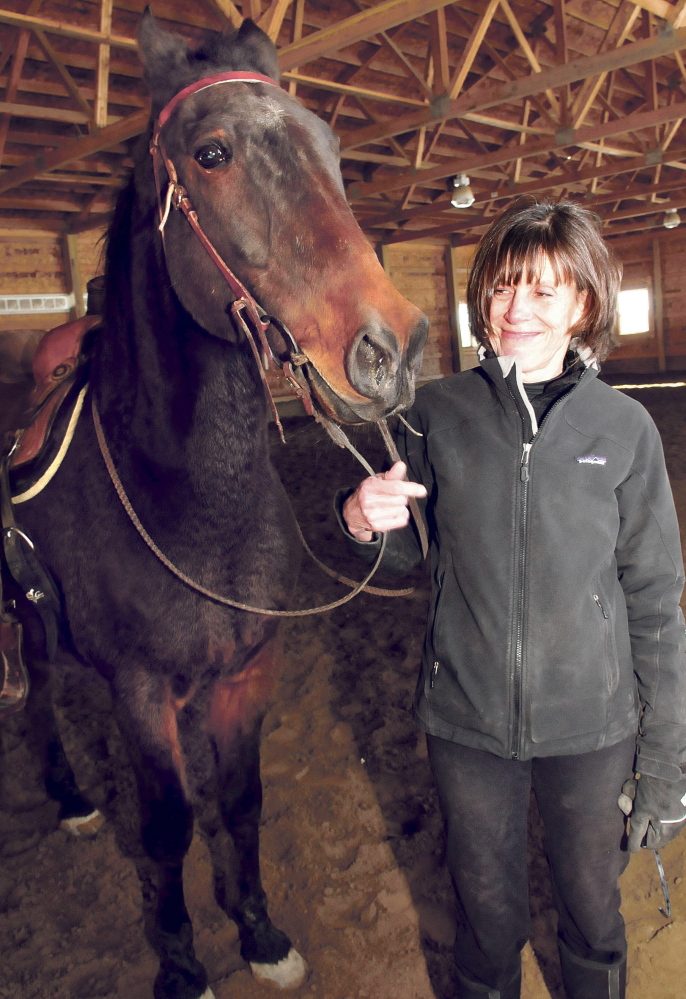NORRIDGEWOCK — The last time racehorse Postcard Jack was on the track at the Skowhegan State Fairgrounds was in August 2010 during a memorial for his namesake.
“Postcard Jack” was the mystery man who for more than three decades sent thousands of anonymous postcards from all over the world to a restaurant in Madison. Jack turned out to be Jack Garbarino, who was 67 when he died in December 2009 in New York City.
On that day at the fair in 2010, Postcard Jack – the winningest standardbred horse in state history – was harnessed up in full racing gear and paced around the track in a memorial lap for Garbarino.
“He knew where he was and what he was supposed to do,” said Debbie Hight, whose family has owned the horse for many years. “He was calm in the paddock. Then he was out on the racetrack and – zoom – away he went.”
The original Postcard Jack, a management consultant with ITT, Dun & Bradstreet and McKinsey & Co., sent 8,000 to 9,000 postcards from all over the world to the Oasis Restaurant in Madison beginning in 1979 – sometimes posting 100 cards in a single month.
He grew up in the Bronx, New York, and attended Fordham University under the ROTC program. Garbarino received his law degree from Yale University, served in the Army and later graduated from Harvard Business School, according to his obituary.
Although he visited the restaurant, later called River’s Edge and now closed, several times over the years, he never revealed his identity.
The mystery of Postcard Jack remained just that for more than 30 years.
MAKING HIM SAFE TO RIDE
Walter Hight of Skowhegan, Hight’s brother-in-law, said he and his business partner, Tom Dillon of Anson, bought a harness racehorse in 1990 and decided to name it Postcard Jack during dinner one night at the Oasis, where many of the postcards were on display.
Now the four-legged Postcard Jack, who turned 25 in March, is being trained to slow down, take new commands and go from a career as a competitive racehorse to a saddle horse.
And it’s not easy, Debbie Hight said.
“We’re trying to make the horse safe to ride for anyone,” she said. “It’s such a great thing to rescue any animal, but they’re dangerous – he was dangerous. He could kill you. That’s what we’re trying to do. We’re trying to teach horses so that people can rescue them.”
Jack is 15.1 hands tall, or about 5 feet 2 inches, from the withers, and weighs about 1,000 pounds.
Postcard Jack retired at age 14 in 2004 as the top horse in Maine history with the most finishes of less than two minutes and the most wins at 77 in 324 starts. He was a pacer, not a trotter.
A pacer is a racehorse whose front legs and back legs move at the same time – right front, right back, left front, left back, Hight said. A trotter’s moves are different with the opposite front leg and rear leg hitting the ground at the same time.
Pacers are faster than trotters, she said.
“We don’t want him to pace because it’s impossible to ride,” Hight said. “This is difficult work.”
Hight’s friend and longtime Norridgewock dairy farmer Rob Rowbottom is in charge of working directly with Jack, helping him adjust from the fast lane to the pathways of leisure riding. Rowbottom, 62, compared his work with Postcard Jack to that of an elementary school teacher who must approach each school subject from the very beginning or be doomed to failure.
“Postcard Jack is not the norm because he raced for a full career; therefore, he’s harder to train, to rehab,” Rowbottom said. “Most of them are out of racing by the time they’re 5. He was 14. What I do is prepare him to be whatever the person who’s going to take him on wants him to be – make sure he’s balanced, he’s safe to ride.”
Rowbottom said he is getting Jack ready to move on as a saddle horse, a job that he loves and one that Jack appreciates because it gives him something to do rather than just lounge around and get old in Debbie Hight’s pasture. But Rowbottom said he has to move slowly, adjusting the horse from the adrenaline of the roaring fairgrounds crowd to the quiet clip-clop of a farm trail or arena.
“I’m just learning now myself,” Rowbottom said. “If you tried to bully him – ho – he’d kill you. He just won’t stand for it. He’s very athletic and he’s very smart. The end result of all the ground work is this nice demeanor. It doesn’t break their spirit – they’re a herd animal. If you’re the leader, they’re fine with it.”
Send questions/comments to the editors.




Success. Please wait for the page to reload. If the page does not reload within 5 seconds, please refresh the page.
Enter your email and password to access comments.
Hi, to comment on stories you must . This profile is in addition to your subscription and website login.
Already have a commenting profile? .
Invalid username/password.
Please check your email to confirm and complete your registration.
Only subscribers are eligible to post comments. Please subscribe or login first for digital access. Here’s why.
Use the form below to reset your password. When you've submitted your account email, we will send an email with a reset code.